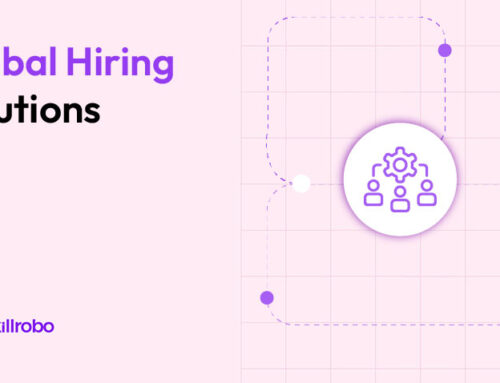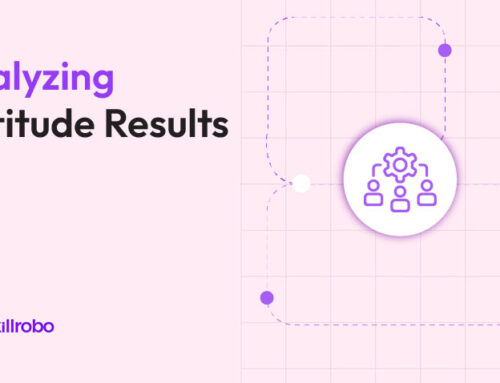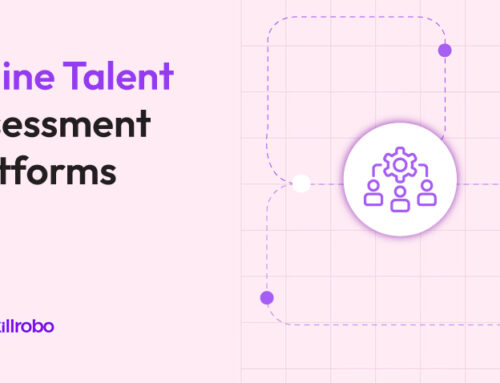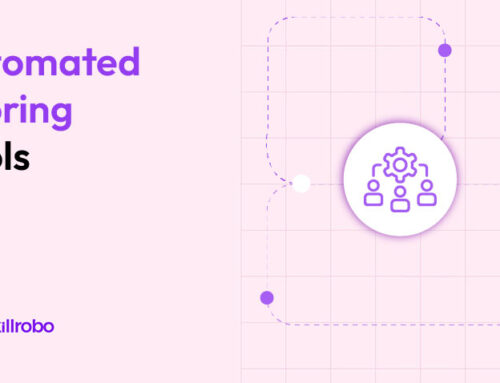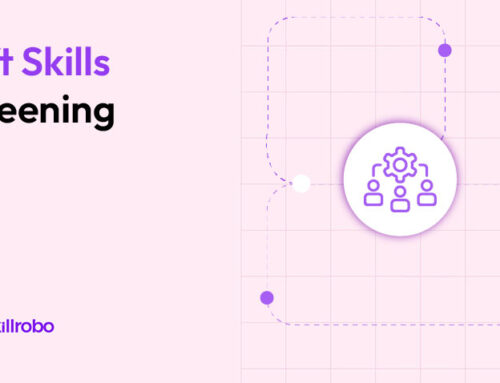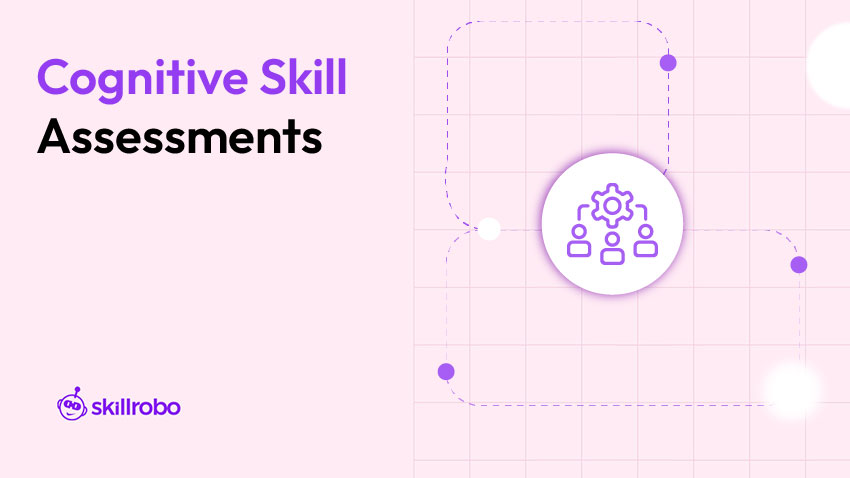
Key Takeaways
- Cognitive ability tests predict candidate potential for learning, problem-solving, and adapting to new challenges.
- Pre-employment screening with cognitive assessments improves decision-making, reduces bias, and enhances team performance.
- Industries such as technology, finance, and healthcare increasingly prioritize cognitive evaluations in hiring strategies.
- Platforms like Skillrobo simplify cognitive test creation, proctoring, and analysis for smarter, faster hiring.
Why Cognitive Ability Matters in Hiring
A resume outlines a candidate’s past experiences, but it rarely reveals their true growth potential. In fast-evolving industries, what matters most is not just what an applicant has done, but how quickly they can learn, adapt, and solve new challenges. Traditional hiring methods often overlook this crucial dimension, relying heavily on surface-level credentials instead of deeper cognitive potential.
Cognitive ability assessments in pre-employment screening bridge this gap. By evaluating how candidates process information, reason through problems, and learn unfamiliar concepts, recruiters gain a much clearer understanding of future performance potential. This approach helps organizations move beyond “gut feeling” hiring, bringing structured, predictive insights into the decision-making process. Companies that prioritize structured pre-employment assessments often find stronger workforce alignment, improved retention rates, and better leadership development pipelines.
In this blog, we’ll explore pre-employment screening for assessing cognitive abilities, what key skills an effective assessment should measure, and how companies can integrate cognitive screening seamlessly into their recruitment workflows.
Understanding Cognitive Ability Assessments
Cognitive ability tests are designed to measure a candidate’s core mental capabilities, such as reasoning, memory, problem-solving, critical thinking, and learning agility. Unlike job-specific technical tests that focus on current knowledge, cognitive assessments predict how well a candidate can acquire new skills, handle increasing complexity, and adapt to unfamiliar challenges over time.
These assessments simulate the real-world mental demands candidates will face on the job, making them highly predictive of future performance, especially for roles that require critical decision-making and rapid learning. Companies incorporating psychometric assessment tests into their hiring frameworks often combine cognitive, behavioral, and emotional intelligence evaluations to create a complete view of a candidate’s potential.
Ultimately, cognitive assessments help organizations select candidates who won’t just fill today’s job requirements but will grow, innovate, and lead within the company over time.
Key Skills Measured in Cognitive Screening
A well-designed cognitive ability assessment measures multiple dimensions of mental agility, not just one skill. Here are the core areas recruiters should focus on when evaluating candidates:
1. Logical Reasoning
Logical reasoning measures a candidate’s ability to draw valid conclusions from given information or data. Strong logical thinkers excel at identifying patterns, spotting inconsistencies, and solving problems efficiently across a wide range of job functions. Companies often include logical reasoning in pre-employment assessment tests to ensure candidates can think critically under real-world pressures.
2. Numerical Ability
Numerical aptitude evaluates a candidate’s comfort with numbers, formulas, and pattern recognition. It’s especially critical for roles in finance, engineering, data analysis, and operations. Testing for numerical ability early in the hiring funnel saves time and helps match candidates to analytically demanding roles.
3. Verbal Reasoning
Verbal reasoning assesses how well candidates comprehend written information, draw inferences, and communicate ideas effectively. Roles that involve negotiation, customer interaction, content creation, or leadership require strong verbal reasoning skills for success. Including verbal reasoning modules during screening, as seen in communication skills assessment tools, helps evaluate a candidate’s ability to articulate and persuade.
4. Abstract Reasoning
Abstract reasoning measures a candidate’s ability to identify relationships between patterns, shapes, and concepts without relying on language or numbers. This skill is crucial for innovation-driven fields where thinking beyond the obvious and recognizing new patterns leads to creative problem-solving.
5. Critical Thinking
Critical thinking assesses a candidate’s ability to evaluate arguments, weigh evidence, and make informed decisions. Strong critical thinkers are essential for leadership, risk management, strategy development, and advisory roles where judgment under uncertainty matters most.
Pro Tip: Avoid relying on a single cognitive domain. Blended cognitive assessments—covering reasoning, memory, numbers, and language—create a fuller, more predictive profile of candidate potential.
Industries Where Cognitive Screening is a Competitive Advantage
While cognitive ability testing originally gained traction in academic and psychological research, it has now become a vital part of recruitment strategies across many industries. As organizations prioritize agility, problem-solving, and learning ability over static knowledge alone, cognitive assessments provide a crucial edge in building future-ready teams.
1. Technology
In the tech sector, rapid innovation demands employees who can quickly master new tools, adapt to evolving programming languages, and solve complex technical challenges. Companies prioritize candidates who demonstrate logical reasoning, abstract thinking, and cognitive flexibility during hiring evaluations.
2. Healthcare
Healthcare roles—ranging from clinical practice to healthcare administration—require strong critical thinking, fast decision-making under pressure, and high attention to detail. Whether diagnosing patients or managing emergency responses, cognitive agility directly impacts outcomes. Employers often supplement technical certifications with psychometric assessment tests that measure decision-making speed and critical reasoning.
3. Financial Services
The finance industry values precision, numerical aptitude, and risk evaluation skills. From investment analysis to financial auditing, success hinges on the ability to interpret complex data sets quickly and accurately. Cognitive testing ensures candidates can manage high-volume, detail-oriented tasks without succumbing to decision fatigue.
4. Sales and Marketing
Modern sales and marketing roles demand strategic thinking, emotional intelligence, and adaptability. Cognitive assessments help recruiters identify candidates who can quickly understand customer needs, analyze market trends, and adjust messaging based on real-time feedback, essential for success in competitive environments.
5. Engineering
Beyond technical qualifications, engineering roles in civil, mechanical, software, and systems design require critical thinking, pattern recognition, and creative problem-solving. By integrating cognitive ability tests early in the hiring process, engineering firms ensure they hire not just technical experts but innovative thinkers.
6. Customer Service and Support
High-performing customer support professionals must juggle complex queries, remain composed under pressure, and deliver accurate resolutions quickly. Cognitive assessments that measure verbal reasoning, memory, and adaptability are particularly valuable in filtering candidates for customer-facing roles.
7. Manufacturing and Production
Manufacturing environments benefit from employees who can follow detailed instructions, troubleshoot unexpected issues, and maintain quality under varying operational conditions. Incorporating cognitive elements into online production skills assessments helps employers predict candidate performance on the factory floor and in supervisory roles.
Common Pitfalls When Using Cognitive Assessments
Even the strongest cognitive testing strategies can fall short if not applied carefully. Organizations must be mindful of how they design, communicate, and interpret assessments to avoid undermining their hiring outcomes.
1. Overemphasizing Scores
While cognitive ability scores provide valuable insights, they are only one piece of the hiring puzzle. A candidate with a high cognitive test score may lack crucial soft skills, emotional intelligence, or cultural alignment needed for success in a specific workplace. For a more complete view, cognitive data should be combined with behavioral and situational assessments to ensure that candidates not only think critically but also fit into team dynamics and organizational values.
2. One-Size-Fits-All Tests
Different roles require different types of cognitive strengths. A standardized test might be ideal for analytical positions, but misses critical indicators for creative, customer-focused, or leadership roles. Tailoring cognitive assessments to align with specific job demands—whether emphasizing numerical reasoning for finance or abstract reasoning for design roles—leads to far more accurate and predictive hiring outcomes.
3. Lack of Transparency
Candidates often perform better when they understand what they are being evaluated on. Cognitive assessments can be intimidating, especially if candidates feel unprepared or unclear about their purpose. Organizations that provide candidates with upfront guidance about the nature of the cognitive test, why it’s being used, and how it fits into the overall hiring process are more likely to see higher engagement rates and authentic test performances.
Pro Tip: Always align your cognitive testing framework with the real success indicators for the role—whether it’s learning speed, decision-making ability, or problem-solving style—instead of relying solely on generic benchmark scores.
Skillrobo: Smarter Cognitive Assessment at Scale
Skillrobo offers a flexible, intuitive platform for organizations seeking to integrate cognitive ability tests into their hiring processes. Recruiters can quickly create customized assessments blending logical reasoning, critical thinking, numerical aptitude, and verbal analysis. The platform’s SEYARC AI enhances test creation by suggesting emerging cognitive skill topics, keeping assessments future-proof.
With built-in proctoring features like webcam monitoring and browser tracking, Skillrobo maintains the integrity of remote assessments across candidate locations. Reports are delivered instantly, categorized by skill area, making it simple for hiring teams to evaluate and compare candidates quickly. Thanks to public URL sharing and mobile-friendly access, assessments are easy to distribute during both small-scale and enterprise hiring campaigns.
Conclusion: Predict Future Success Through Cognitive Screening
Technical knowledge can be taught. Critical thinking, problem-solving, and adaptive intelligence often cannot. Pre-employment cognitive ability assessments allow companies to look beyond surface qualifications and predict which candidates are most likely to thrive in changing environments.
By adopting smart cognitive screening strategies—and using platforms like Skillrobo to simplify implementation—organizations build teams equipped not just for today’s challenges, but for tomorrow’s opportunities. Sign up for Skillrobo today to create smarter, more predictive cognitive assessments that power better hiring decisions.
Table of content
- Key Takeaways
- Why Cognitive Ability Matters in Hiring
- Understanding Cognitive Ability Assessments
- Key Skills Measured in Cognitive Screening
- Industries Where Cognitive Screening is a Competitive Advantage
- Common Pitfalls When Using Cognitive Assessments
- Skillrobo: Smarter Cognitive Assessment at Scale
- Conclusion: Predict Future Success Through Cognitive Screening



